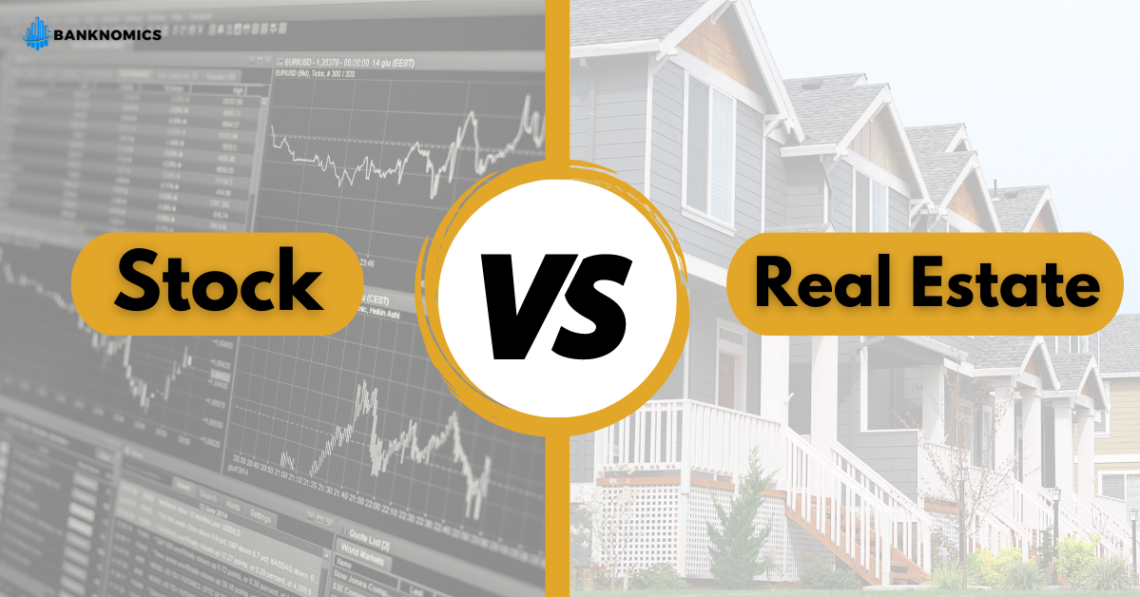When it comes to investing, two major options often come to mind: stocks vs real estate. Both avenues offer the potential for significant financial growth and long-term wealth accumulation. However, choosing between the two can be a daunting task.
In this comprehensive guide, we will delve into the merits of both stocks and real estate as investment options, helping you make an informed decision based on your financial goals and risk tolerance.
The Ultimate Guide: Comparing Stocks and Real Estate – Which Investment Option is Superior?
Keep in mind that prior to making any investment choices, it is essential to perform comprehensive research, consult with experts, and evaluate your personal financial circumstances and objectives with caution.
I. Stocks: The Power of Market Participation
Stocks, or equities, represent ownership shares in a company. Investing in stocks allows individuals to become shareholders and participate in the company’s profits and growth. Here are some key points to consider:
Liquidity and Flexibility
One of the primary advantages of investing in stocks is their liquidity. Unlike real estate, stocks can be easily bought and sold on various exchanges, providing investors with the flexibility to react quickly to market conditions or changes in their investment strategies.
Diversification
Stocks offer a wide range of investment opportunities across different sectors, industries, and geographic locations. Diversifying your stock portfolio can help mitigate risk by spreading your investments across multiple companies, reducing the impact of a single stock’s poor performance.
Growth Potential
Historically, the stock market has shown impressive long-term growth potential. Over time, well-managed companies have the potential to generate substantial returns, especially if you invest for the long haul. However, it’s important to note that stock prices can be volatile in the short term, requiring patience and a long-term perspective.
II. Real Estate: Tangible Assets and Steady Returns
Real estate, on the other hand, refers to physical property, including residential, commercial, or industrial buildings, as well as land. Let’s explore the advantages of investing in real estate:
Tangible Assets
Real estate provides investors with tangible assets, which can be a comforting factor for many. Unlike stocks that represent ownership in a company, real estate investments allow you to physically own properties, providing a sense of security and stability.
Cash Flow and Passive Income
Rental properties can generate consistent cash flow in the form of rental income. By acquiring properties and renting them out, you can create a stream of passive income that can supplement your regular earnings or be reinvested into additional properties.
Potential for Appreciation
Real estate values have historically appreciated over time, offering the potential for capital gains. By carefully selecting properties in areas with favorable economic conditions and growth prospects, investors can benefit from property value appreciation and potentially sell at a profit in the future.
III. The Decision: Which Investment Option is Better?
Determining whether stocks or real estate is a better investment option depends on several factors, including your financial goals, risk tolerance, and investment horizon. It’s essential to consider the following points when making your decision:
Risk and Volatility
Stocks generally involve more short-term volatility, as they are influenced by market forces, economic conditions, and company-specific factors. Real estate, on the other hand, tends to be relatively stable but may have longer-term risks associated with property market cycles.
Time and Involvement
Investing in stocks typically requires less time and involvement compared to real estate. Real estate investments involve property management, tenant selection, and maintenance responsibilities. Stocks offer a more hands-off approach, with the ability to invest in diversified portfolios managed by professionals.
Diversification
Stocks offer greater diversification opportunities compared to real estate. The stock market allows you to invest in various sectors, industries, and companies worldwide. In contrast, real estate diversification involves owning multiple properties in different locations or investing in real estate investment trusts (REITs) that hold diversified portfolios of properties.
Conclusion
In the debate between stocks and real estate as investment options, there is no definitive answer. Both avenues offer unique advantages and disadvantages. Stocks provide liquidity, flexibility, and growth potential, while real estate offers tangible assets, steady income, and the potential for appreciation.
Ultimately, the decision should be based on your financial objectives, risk tolerance, and personal circumstances. Many investors find success in diversifying their portfolios by incorporating both stocks and real estate, harnessing the benefits of both asset classes.
Remember, before making any investment decisions, it is crucial to conduct thorough research, seek professional advice, and carefully assess your own financial situation and goals.
Read more about Investment!
Keep reading and supporting Banknomics!





